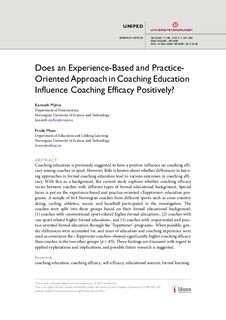| dc.contributor.author | Myhre, Kenneth | |
| dc.contributor.author | Moen, Frode | |
| dc.date.accessioned | 2017-12-08T09:10:15Z | |
| dc.date.available | 2017-12-08T09:10:15Z | |
| dc.date.created | 2017-12-07T14:40:31Z | |
| dc.date.issued | 2017 | |
| dc.identifier.citation | UNIPED. 2017, 17 (3), 235-248. | nb_NO |
| dc.identifier.issn | 1893-8981 | |
| dc.identifier.uri | http://hdl.handle.net/11250/2469675 | |
| dc.description.abstract | Coaching education is previously suggested to have a positive influence on coaching efficacy among coaches in sport. However, little is known about whether differences in learning approaches in formal coaching education lead to various outcomes in coaching efficacy. With this as a background, the current study explores whether coaching efficacy varies between coaches with different types of formal educational background. Special focus is put on the experience-based and practice-oriented «Topptrener» education programs. A sample of 614 Norwegian coaches from different sports such as cross-country skiing, cycling, athletics, soccer, and handball participated in the investigation. The coaches were split into three groups based on their formal educational background: (1) coaches with «conventional sport-related higher formal education», (2) coaches with «no sport-related higher formal education», and (3) coaches with «experiential and practice-oriented formal education through the ‘Topptrener’-programs». When possible, gender differences were accounted for, and years of education and coaching experience were used as covariates; the «Topptrener coaches» showed significantly higher coaching efficacy than coaches in the two other groups (p < .05). These findings are discussed with regard to applied explanations and implications, and possible future research is suggested. | nb_NO |
| dc.language.iso | eng | nb_NO |
| dc.publisher | Universitetsforlaget | nb_NO |
| dc.rights | Navngivelse-Ikkekommersiell 4.0 Internasjonal | * |
| dc.rights.uri | http://creativecommons.org/licenses/by-nc/4.0/deed.no | * |
| dc.title | Does an Experience-Based and Practice- Oriented Approach in Coaching Education Influence Coaching Efficacy Positively? | nb_NO |
| dc.type | Journal article | nb_NO |
| dc.type | Peer reviewed | nb_NO |
| dc.description.version | publishedVersion | nb_NO |
| dc.source.pagenumber | 235-248 | nb_NO |
| dc.source.volume | 17 | nb_NO |
| dc.source.journal | UNIPED | nb_NO |
| dc.source.issue | 3 | nb_NO |
| dc.identifier.doi | 10.18261/ISSN.1893-8981-2017-03-05 | |
| dc.identifier.cristin | 1524357 | |
| dc.description.localcode | © 2017 Author(s). This is an Open Access article distributed under the terms of the Creative Commons CC-BY-NC 4.0 License (http://creativecommons.org/licenses/by-nc/4.0/). | nb_NO |
| cristin.unitcode | 194,65,30,0 | |
| cristin.unitcode | 194,67,70,0 | |
| cristin.unitname | Institutt for nevromedisin og bevegelsesvitenskap | |
| cristin.unitname | Institutt for pedagogikk og livslang læring | |
| cristin.ispublished | true | |
| cristin.fulltext | original | |
| cristin.qualitycode | 1 | |

